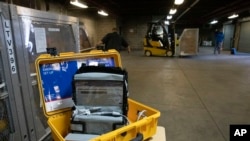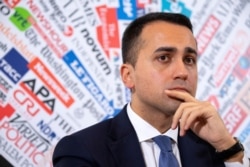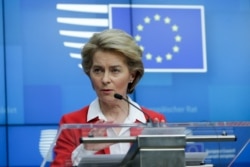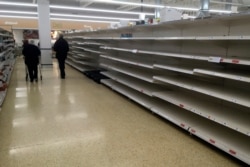European governments are scrambling to secure tens of thousands of additional ventilators as well as personal protective gear for health workers, while trying to calm public fears over food supplies, as the coronavirus crisis worsens.
But countries are competing with each other for the medical equipment they will need, and are fearful they will end up in the position of hard-pressed Italy, where the COVID-19 case numbers and deaths are continuing to soar, despite a strict national lockdown.
Because of desperate shortages, Italian doctors are having to decide who among the severely sick should be hooked up to ventilators, the oxygen-pumping machines crucial to help patients keep breathing as their lungs fill with fluid. In some northern Italian hospitals, anyone over the age of 60 is not being hooked up, according to some doctors.
The exponential growth in coronavirus cases is unnerving officials across the European continent, who fear their health care systems also will buckle under the pressure.
In Britain, Prime Minister Boris Johnson has urged manufacturers, among them auto-makers, to adapt their production to churn out what the country’s national health service needs. The National Health Service wants at least 20,000 to 30,000 more ventilators on top of the 8,000 it has already.
The British government has asked suppliers to build “as many ventilators as they can,” and offers of help have poured in from a variety of businesses including automakers Jaguar and Rolls Royce, F1 racing teams and manufacturers of vacuum cleaners and lawnmowers. Meggitt, a British engineering firm that makes parts for the aerospace and defense industries, is heading a group of companies which plans to produce tens of thousands of ventilators.
Some smaller businesses like Gtech, which produces garden machinery, are developing their own prototypes.
“I'm confident we can build them in a short time and in quite high volume…I'd estimate at a thousand a day,” Nick Grey, the company’s founder, told Sky News.
The government has released the designs of a preferred ventilator to manufacturers but is ready to approve other designs non-specialist firms are better able to produce. And it is funding an organization called Frontier Technology, which is collaborating with University College London, to work up designs based on rapidly manufactured ventilation systems (RMVS) already used in developing countries.
Italy, the initial epicenter of the European outbreak, has ordered its only domestic ventilator manufacturer, Siare Engineering, to quadruple monthly production from 125 machines to 500 and it has sent soldiers to help the company meet the new quota. But that will not be enough to address the shortfall that is forcing doctors to prioritize who to hookup, say officials.
Nations looking for help
Italian ministers have turned to other European Union countries to help with the supply of ventilators and protective gear for medical staff, including face masks, but has found neighbors slow to respond.
“Should other countries want to help us out in this war, they’re welcome to. Our country is on the front lines,” said Italian Foreign Minister Luigi Di Maio.
Neighboring governments are fearful about letting go of supplies they will need shortly, and Di Maio has complained about the lack of solidarity, turning to China instead for some medical gear. Other countries are also seeking assistance from China, including central European and Balkan states.
France and Germany earlier this month prohibited the export of durable medical equipment and protective clothing, earning criticism from European Commission President Ursula von der Leyen, who announced last week Brussels is setting up an EU medical reserve of equipment. Germany lifted its export ban Monday. But with a global shortage of ventilators and other desperately needed items, most EU countries are focusing on their needs.
Germany has ordered an additional 16,000 ventilators from a major domestic supplier and, like Britain, France is eyeing ventilators outside their public health systems held by private hospitals.
Many companies across Europe have responded to calls for help by retooling their factory lines to plug holes in the durable medical equipment and protective gear needs.
Perfume-makers Givenchy and Christian Dior are making hand sanitizers, as have some alcohol giants such as Absolut Vodka. Spanish fashion retailer Zara is making face masks and hospital gowns and produced 40,000 masks by the end of last week.
Panic buying
But while companies are showing national solidarity, there’s rising frustration among some European governments with the behavior of some of their own populations, especially when it comes to emptying supermarket shelves.
British consumers have stockpiled more than a billion dollars’ worth of food in just the last couple of weeks, forcing supermarkets to start imposing strict limits on the purchase of popular items.
The hoarding of food prompted the head of the NHS to say that panic buyers “should be ashamed,” because medical staff are being left without much to buy after putting in long shifts at hospitals.
NHS medical director Stephen Powis reacted to a video posted online of a critical care nurse crying because of the difficulties she faced in buying staples.
“Frankly we should all be ashamed that that has to happen,” he said. “It’s unacceptable. These are the very people that we will all need to look after perhaps us or our loved ones in the weeks ahead.”
Some supermarket chains have started to deploy guards to police queuing zones and to try to ensure shoppers maintain safe distances.
British manufacturers have increased production by 50 percent, ministers say, and supermarket chains are now collaborating on deliveries and sharing warehouses and staff.
Grocery chiefs say the food supply chain should in theory hold up but the dramatic shift in consumer behavior has temporarily disrupted the market. The government is to introduce rules restricting food deliveries to supermarkets so stores can cope with increased demand and to keep shelves stocked.
Britain’s environment and food minister, George Eustice, urged consumers at a news conference Saturday to “be responsible when you shop and think of others.”
“There is more than enough food to go around and our food supply chain is able to expand production to cope with increased demand,” he added.
Other European governments are also grappling with the panic buying, which risks igniting food price inflation, a senior economist at the U.N.’s Food and Agriculture Organization has warned.
“All you need is panic buying from big importers such as millers or governments to create a crisis,” FAO’s Abdolreza Abbassian told Reuters. “It is not a supply issue, but it is a behavioral change over food security. What if bulk buyers think they can't get wheat or rice shipments in May or June? That is what could lead to a global food supply crisis."
There are also fears that border restrictions imposed by some European Union countries are starting to disrupt food supplies.








